The NI¿¿ER LOVERS: An Amerikkan Musical
Marc Anthony Thompson, Writer & Composer
Magic Theatre
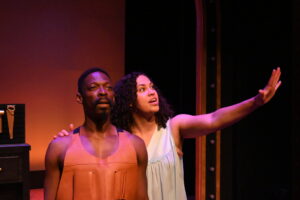
In 1848, a young, married couple devised and successfully executed in eight days a daring, dangerous plan to escape the horrific bondage of slavery in Macon, Georgia to find freedom in Boston – the light-skinned wife disguised as a man and her darker-skinned husband, as her servant. The true story of Ellen and William Craft, who in freedom became leading abolitionists, is recounted in their 1860 memoir, Running a Thousand Miles to Freedom, and has been announced as the subject of an upcoming movie, Everlasting Yea, by Lynn Notage and Tony Gerber starring Jovan Adepo and Juliana Canfield.
But for most Americans today, this incredible story is still one largely untold, unknown. Through a commission by Magic Theatre, composer, songwriter, musician, and performer Marc Anthony Thompson now turns playwright to open the world premiere of the Crafts’ story told in a manner that can only be described as bold, shocking, funny, enlightening, devastating, irreverent, joyful, and hopeful. The playwright and Magic do so in a work with a title we dare not say aloud: The NI¿¿ER LOVERS: An Amerikkan Musical. The result is a monumental theatrical achievement of arresting visual, dramatic, musical, and movement art through which the story of the Crafts is brought to light as a story not just of important, untold history, but as a continuing saga of our society’s search for freedom from hate and prejudice and for the establishment of a land – our own land – where love finally reigns supreme.
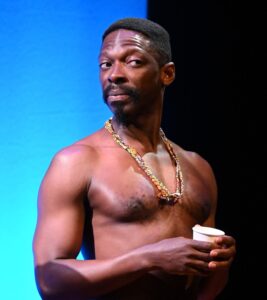
As the lights go down, we hear the sounds of an ocean’s waves smacking against a boat; of muffled moans; and of the cries of hungry babies as well as of the cries of pained, adult agony punctuated by the crack of a whip. The red curtain of a stage that looks suspiciously like the foot-lighted stage of once-popular minstrel shows opens to reveal two, silhouetted men at a water cooler. We soon meet loin-clothed and otherwise naked Winston (Rotima Agbabiaka) and Reginald (Aejay Marquis Mitchell) speaking in high-toned English about their joint journey on a ship to a land called Martha’s Vineyard that they saw advertised in a travel pamphlet. They share pictures and funny anecdotes of the family left behind – both admitting their wife or same-sex partner does not like water and thus remained home – and their plans to establish themselves in good-paying jobs either “in the fields or in a household.” Reginald also hopes to find company in plenty of the promised beauties like the white, blonde pin-up girl he shows his new pal, Winston.
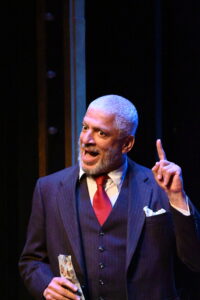
A distinguished Black man in three-piece suit and tie (Donald E. Lacy, Jr.) wanders to the water cooler room and begins to pick apart their fantasies. The only white women they as Black men are going to see, he tells them, “are in pornographic movies and Broadway, acclaimed plays.” He also shows them the fine print of the contracts they signed, details missed by the two that say they are to become “chattel, movable goods, and property.” The outcome of this cruise, he patiently explains, is that you are “no longer human,” that “your women and you will be crushed,” and that worst of all, “you will walk in shoes.”
This truthteller also informs Winston and Reginald that the name they will now forever by called is the word in the play’s title that most of us find unspeakable. That same word will be echoed in the next ninety minutes scores of times in jokes, songs, banter, and teasing by this stellar cast of five while they also convey the devastating legacy of hate and torture that same word has had – and still has – for Blacks in America.
As co-directors, the playwright and Sean San José ingenuously combine modernity and history in the ways scenes and sets are constructed, the language used by cast, and the music composed and sung. While the heart of the production is the story of Ellen and William Craft’s historically accurate escape, the telling is one spliced with surprises such as their sudden, fantastical acquisition of special powers (like chess playing, reading, and French); scenes of their erotic lovemaking; and a white rather dumb but dangerous demon who refuses to die when repeatedly killed by them.
In their meager, slave abode, William introduces to his wife the idea of seeking freedom in “a place where even a Black man can manage a basketball team” and “where they (Blacks) run down the street without being chased by their masters.” Though neither really knows what “basketball” is, the dream persists. Events where each is confronted/threatened by a white priest or the white “Massa Collins” (their ‘owner’ and father to Ellen) and where Ellen is wrongly identified as the young son of Massa Collins provide the impetus in this tale’s mixture of fact and fiction for the two to set out on boat and train to freedom as a white man and his Black servant.
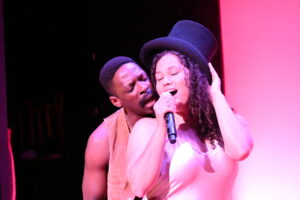
Aidaa Peerzada and Rotimi Agbabiaka each display a wide range of exceptional emotional and character personifications as Ellen and William, respectively. Their movie-scene passion for each other in settings bare and harsh, their bravery against impossible circumstances as well as their individual moments of fear and doubt, and their super-hero powers and physical strength the playwright provides them to overcome evil are all performed in a manner such that we care not what is fact or fiction since the truth engulfed in all their experiences is evidence enough of their realities.
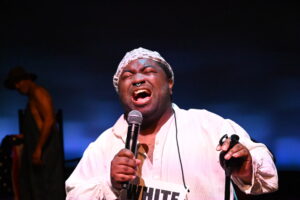
The evil they often must overcome is brilliantly and comically portrayed in various characters by Aejay Marquis (who uses the pronouns they/them). They repeatedly play white men by wearing a big sign around their neck declaring they are such and by speaking in Southern drawl and displaying attitudes of inborn superiority, racist hate, and overall, clear stupidity. Through them, the playwright reminds us of the Church’s role in justifying and perpetuating slavery (and racism) and of the seemingly impossible task historically (and by implication, also to-date) for Blacks to eradicate the racists like the ones they play. When Aejay Marquis steps up to the mike to usurp as a white man the very essence of Black-born music by singing in full, powerful Motown style, “Have You Ever Loved a Woman,” their reverberating Detroit sounds and slick moves give way to uncontrollable spasms and shakes before they collapse like a slithering snake on the ground – all so stunningly displaying the role white men have too often played in desecrating the lives and well-being of Black women.
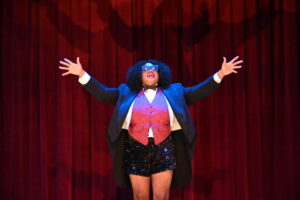
Intermingling the scenes related to Ellen and William are interludes where Tanika Baptista bursts from behind the curtain in her top hat, tails, netted stockings, and spangly shorts to act as a kind of MC, stand-up comic, and provocateur – with more than a subtle reference to the role the white interlocutor used to play during black-faced minstrels (a very racist form of entertainment widely popular in the U.S. from the nineteenth century deep into the twentieth – especially in the South). She speaks directly to us as audience with big smiles and lots of charisma, kidding us; pushing us out of our comfort ranges (especially those of us white); kibbitzing with shared familiarity with those in the audience who are Black; and using continuously the ‘N-word’ with much gusto, glee, and guts. But this M.C. is also here to challenge us and teach us – sometimes like a preacher, sometimes like a friend, sometimes like a prophet. Hers is a commentary that compliments without mentioning the story we are watching.
She challenges us, “Time may not be able to be stopped, but together we may be able to change the arc.” She warns that in our world “love is in danger” and that “the sickening trend of glorifying the past has got to end tonight.” The playwright and director cleverly employ Tanika Baptiste’s role to loosen us up, make us squirm, and then to be sure we will take away from the evening some of the key messages (with she repeatedly telling us to “write this down”).
Surrounding and supporting the knock-the-socks-off performances of this cast is an outstanding creative team. Brittany White’s set design of minstrel-like stage and various scenes established behind the curtain pop to life through the lighting artistry and imagination of Alejandro Acosta. Corrida Carr’s costumes masterfully and pointedly bring to mind both present and past as history is revealed with current implications. Finally, Marc Anthony Thompson creates an arena of oft-haunting sounds that help us picture vividly horrors we are not actually seeing while at the same time also reminding us through snippets of music that could be from any of a number of more modern decades that what we are watching is not simply something to relegate to another era.
So much packed into only ninety minutes. So much to continue to contemplate after exiting the theatre. So much still to do. A ticket to Magic Theatre’s world premiere of Marc Anthony Thompson’s The NI¿¿ER LOVERS: An Amerikkan Musical is a ticket to an evening of entertainment that cannot adequately be described in a review but must be absorbed in person, with the operative word being must. This is a show that is a must-see if ever there was one.
Rating: 5 E, MUST-SEE
A Theatre Eddys Best Bet Production
The NI¿¿ER LOVERS: An Amerikkan Musical continues through May 21, 2023, in a world premiere production by Magic Theatre, Fort Mason, 2 Marina Blvd., Building D, 3rd Floor, San Francisco. Tickets are available online at www. Magictheatre.org or by phone at 415-441-8822.
Photo Credits: Jay Yamada
